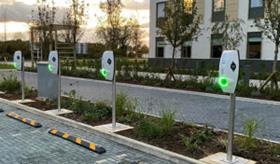
Ahead of this month's exciting new industry show - the Road Transport Expo - MT caught up with the show's Charging Partner and infrastructure expert EQUANS to hear its guidance to operators on planning for a zero-emission future...
Heavy transportation vehicles are responsible for around 7% of global carbon emissions. That’s why decarbonising HGVs is a government priority in the drive to combat climate change. The UK government has pledged that all new HGVs in the UK will be zero-emission by 2040, and that non-zero emission HGVs weighing under 26 tonnes will be phased out by 2035.
Time to plan for the EV transition
HGV operators need to begin planning today for the switch to zero-emission vehicle fleets. Many hauliers have already committed to transitioning their heavy-duty fleet to electric vehicles, and manufacturers are well advanced in developing new models of electric truck (eTruck). While these vehicles are still in the early stages of adoption in the UK, McKinsey estimates that eTruck uptake globally will exceed 30% by 2030 across light, medium and heavy-duty vehicles.
For some businesses, electric vehicles may not always be the best option. In these cases, fleet operators may consider switching to alternative zero-carbon fuels, such as hydrogen.
When it comes to planning for fleet electrification, there are many considerations for haulage companies, from choosing the right models of eTruck, to adopting the optimum charging strategy. A successful transition to electric HGVs requires a methodical, structured approach.
Assess your fleet requirements
The first step is to map out your typical vehicle movements throughout the week. Think about how far trucks in your fleet travel each day, where they are parked when not in use, and where they pause in their journeys.
Your charging strategy will be influenced by the model of eTruck you choose. Think about how long your drivers are on the road and where they may be able to charge. Vehicle manufacturers can help you understand which models work best for your operational practices, load requirements, travel distances and other factors.
Whatever electric vehicles you choose, it makes sense to start with a small number of trucks initially. That will enable you to test and refine your strategy, find the optimum charging regime, and adapt your route planning – before scaling up your eTruck fleet.
Long-term cost considerations
Ultimately, operating a fleet of eTrucks will save considerable costs on fuel and maintenance over the life of the vehicles. One of the reasons many haulage companies have been slow to adopt electric vehicles is the high initial purchase price. However, it’s important to weigh up the total cost of ownership, by balancing initial investment costs against lifetime operational expenses.
According to a recent white paper by the International Council on Clean Transportation (ICCT), battery electric long-haul trucks operating in the UK will reach total cost of ownership parity with diesel trucks by 2026. They have already achieved parity in other parts of the world.
Choose the optimum charging solution
The right charging strategy for your business will be determined by the maximum charging power of your vehicles, their route patterns, and where it is most feasible to charge them. Could the fleet be charged at the depot, or will you need to rely on public charging networks? Heavy goods transport routes are often confined to main roads, ports and terminals – and these are likely to become key charging hubs as the UK charging network expands.

When it comes to investing in your own charging infrastructure, there are essentially two types of HGV charger to choose from. AC chargers, known as fast chargers, which are rated at 22kW or below, and DC chargers, known as rapid chargers, which provide power from 50kW up to 350kW.
Your choice of chargers will be determined by the length of time your vehicles spend at base. If vehicles are parked at your depot overnight, this is the ideal time to charge them using a fast charger. If your operations require a quick turnaround, you may need a rapid charging infrastructure to help maximise vehicle uptime. You can, of course, choose a combination of fast and rapid chargers to provide flexibility in the way your fleet is operated.
Specialist support for the EV transition
To help road haulage firms make the transition to eTruck fleets, EQUANS has a dedicated EV Solutions business. With more than 10 years’ experience in the e-mobility sector, our specialists provide a complete end-to-end service, from initial planning and infrastructure design through to charger installation and ongoing management.
Our approach follows a simple four-step process:
- Planning - From scoping the requirements to building the business case and engaging internal stakeholders, we plan the best EV roadmap for your fleet and business.
- Design - Our experts design the right charging solution for your business, identifying the appropriate hardware, installation approach, systems and services for your EV fleet and depots.
- Delivery - We complete every aspect of EV implementation, from sourcing the hardware and preparing all groundworks through to installation and onboarding by our accredited engineers.
- Management - Our ongoing management options and proven software platform enable us to fully support, optimise and maintain your EV infrastructure, now and in the future.
Performance optimisation and carbon reporting
If you choose to install your charging points through EQUANS, you’ll have access to a cloud-based management platform to help you manage, maintain and optimise your charging network.
Our system provides a single dashboard where you can access valuable insights, such as charger performance, usage data and carbon reporting. It enables you to measure the CO2 emissions saved by your EV systems, so you can report on your contribution to decarbonisation, and measure progress against carbon-reduction targets.
Don’t get left behind on the road to EV
While the switch to fully electric HGVs may seem a long way off, there’s no time to lose in preparing for this essential transition. Businesses that get ahead now could gain the competitive advantage in an economy that increasingly values sustainable, carbon-free goods, services and suppliers.
No matter where you are on your journey to fleet electrification, EQUANS specialists can help you plan and implement the right solution for your business.

EQUANS is the official charging partner for Road Transport Expo 2022, which takes place from 30 June to 2 July at NAEC Stoneleigh. Visit the team on stand O3 to find out more about its EV solutions and take part in a series of informative talks taking place daily at the show. Register today for your free ticket to attend!














